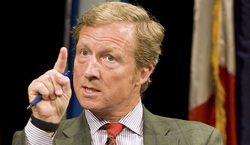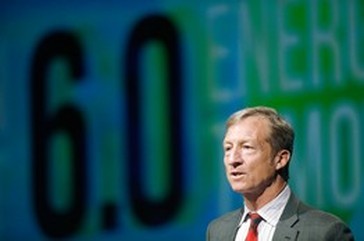
MAY 6, 2014 11:01 AM
Steyer Strikes Blow against Small-Town Unions
The environmentalist tycoon pours money into a local election to kill a job-creating project.

There’s one man primarily responsible for this precipitous spending hike: Tom Steyer, an environmental enthusiast, hedge-fund manager, California billionaire, and emerging Democratic kingmaker.
Steyer’s interest in these four obscure local races is simple. The Whatcom county council will ultimately decide the fate of a proposed coal-export facility on the West Coast. If it receives approval, it would be the largest such American facility on the West Coast, but Steyer and his green allies fervently oppose the use of coal, so they spent heavily to support council candidates likely to vote against the export facility. Their efforts were ultimately successful, with candidates perceived as green winning all four contested seats.
"I wouldn’t say [Steyer] was decisive, but he definitely moved the needle [in] the environmental candidates’ favor,” says Todd Donovan, a political-science professor at Western Washington University, which is located in Whatcom County. “He provided an unprecedented amount of money spent on behalf of the environmental candidates, and they all won — and they were fighting an uphill battle. . . . We’ve never seen anything like it.”
Steyer’s political action committee, NextGen Climate, gave $275,000 to the Washington Conservation Voters Action Fund, which in turn spent at least $210,000 on the Whatcom county-council elections. But it’s impossible to get an exact figure for how much Steyer money was spent in Whatcom County.
Randy Pepple, a Republican political strategist in Washington State, says Steyer’s lack of transparency was particularly alarming.
“Instead of Tom Steyer for NextGen PAC writing the checks, instead he wrote them to other organizations that were spending money, particularly the Conservation Voters,” he says. “He hid it. For all his challenges on Politico to be transparent, up here, he laundered money through political committees, so it was not entirely clear where he put all his money.”
Outside cash may have played an instrumental role in the Whatcom county-council elections, but that’s not the only development bothering some of its residents. In particular, union members in Whatcom County are concerned that, if the coal-export facility fails to garner council approval, there will be a huge economic cost.
The proposed Gateway Pacific Terminal would export up to 54 million metric tons each year, the majority of which would be coal extracted in Wyoming and Montana being shipped to buyers as far away as China. The export terminal would also pay more than $92 million in state and local taxes in the two-year construction period alone, and then contribute $11.2 million a year to the government’s coffers after the project’s completion.
Approval would result in nearly 4,500 construction jobs, as well as 1,250 permanent jobs in Whatcom County — no small matter in a region where unemployment in February 2014 was 7.4 percent. And many of the jobs the Gateway Pacific Terminal would provide are unionized, a fact that hasn’t escaped the notice of local labor leaders like Mike Elliott, a spokesman and lobbyist for the Washington State Legislative Board of the Brotherhood of Locomotive Engineers and Trainmen.
“These are the types of jobs we want to create,” Elliott tells National Review Online. “We weren’t going to get on board with these projects unless they would use union construction people and union longshoremen to run the thing. But opponents brought in this billionaire environmentalist from California, and not just him — they’ve come up with a whole lot of money. They’ve got more resources than we will ever have, and it makes all the difference in the world. You shouldn’t be able to come in with a wheelbarrow full of money and influence the electoral process. I just think that’s wrong.”
In Whatcom County, Steyer’s big donations helped Democrat-affiliated groups outspend their Republican counterparts two-to-one. But he may well have created an interesting dilemma for Democrats during future elections. Steyer’s spending in Whatcom County pitted environmental groups against organized labor, creating a deep division among two of the Democrats’ key constituent groups.
Steyer’s spending may have a similarly divisive effect on the national stage. In February, he pledged to donate more than $100 million in support of environmentalist Democratic candidates. Just two months later, the Obama administration announced it would opportunely delay its decision on the approval of the Keystone XL pipeline, a project as reviled by environmental groups as it is beloved of Big Labor.
Ken Oplinger, a self-identified “business Democrat” who served as head of the Whatcom County Chamber of Commerce for a decade, tells NRO that while intra-party divisions may not be enough to win labor over to Republicans, they may well split the vote between Democratic candidates.
“In Whatcom County, because the coal terminal was such an all-encompassing issue, it really did play a role because it was the key issue for labor,” he says. “In places where economic development and jobs [are pitted against environmental concerns], you’ll see that happen, and it’s going to be on a case-by-case level. The blue-green connection is still there, and it’s still strong. But they’re going to disagree on some key issues, and when [they do], it may play a role in those races as it did in Whatcom County.”
— Jillian Kay Melchior writes for National Review as a Thomas L. Rhodes Fellow for the Franklin Center. She is also a senior fellow at the Independent Women’s Forum
- - - -
While Steyer's bio reads like Mr. Green, you can find out more about the guys actual corporate interests and investment strategy from this April 24, 2014 article at the Wall Street Journal:
 At Clean Energy Summit in Las Vegas (Getty Images)
At Clean Energy Summit in Las Vegas (Getty Images) The anti-Keystone billionaire throws stones at the Kochs, but what about his motives?
The psychiatric world defines "projection" as the act of denying unpleasant qualities in yourself, while attributing them to others. Consider liberal billionaire Tom Steyer's riff this week about the libertarian billionaire Koch brothers.
Mr. Steyer took exception in a C-SPAN interview to comparisons between his big-dollar funding of Democrats with the Koch brothers' big-dollar funding of Republicans. The Kochs' priorities "line up perfectly with their pocketbooks—and that's not true for us," said Mr. Steyer, who is fighting against the Keystone XL pipeline. Moreover, he insisted, his politicking is "completely open," whereas the Kochs have "not been huge embracers of transparency."
Why is Mr. Steyer so touchy about motives and transparency? The media tend to give liberal spending a pass, since they assume its motives and aims are pure. Mr. Steyer's problem—and he knows it—is that his own purity remains hugely suspect, even among his allies.
It's old news that the billionaire reaped his fortune at hedge fund Farallon Capital, via investments in "dirty" oil and coal projects. Mr. Steyer, who retired from the firm in late 2012, has since publicly repented for his prior investment ways. But what many greens remember is that he didn't do so until he was caught.
Mr. Steyer had spent months fighting Keystone, attending anti-coal rallies and urging colleges to divest from "fossil fuels," before the press noted that his money was still parked at Farallon, still profiting from Kinder Morgan pipelines and coal projects. It was only then, last July, that Mr. Steyer issued a press release saying he'd directed his money be moved to a fund that didn't invest in "tar sands" or "coal" and pledged this process would be complete by the end of 2013.
And don't think that environmentalists failed to notice Mr. Steyer's specific divestment instructions. He did not say in that July press release that he was pulling his money from "fossil fuels"—only tar sands and coal. That may be because Mr. Steyer as recently as 2012 wrote an op-ed in this newspaper supporting more natural-gas extraction, and last year (as the Keystone debate raged) he helped fund a University of Texas study that supported fracking. Farallon over the years has held positions in natural-gas companies.
more

 RSS Feed
RSS Feed
